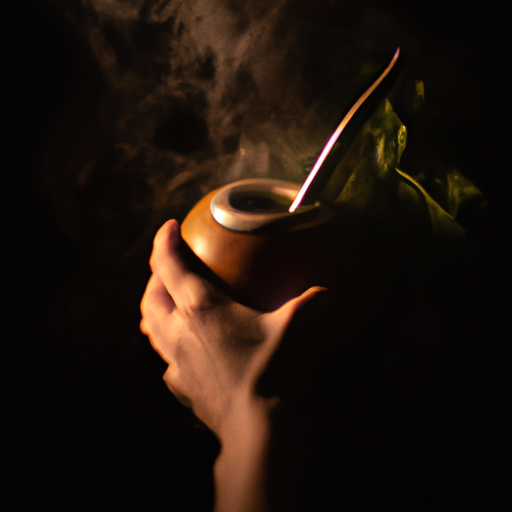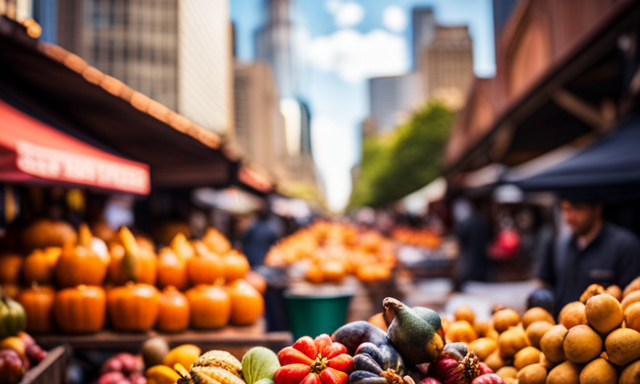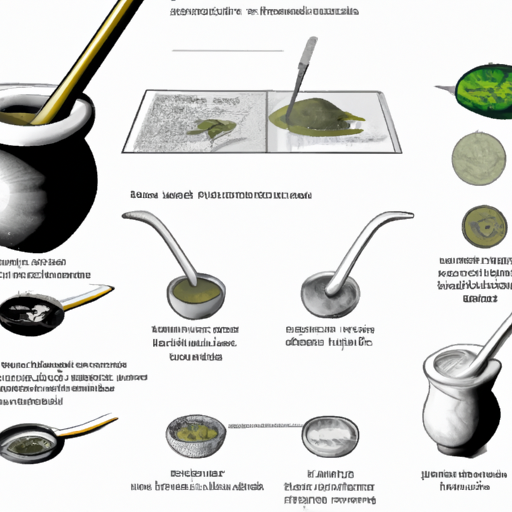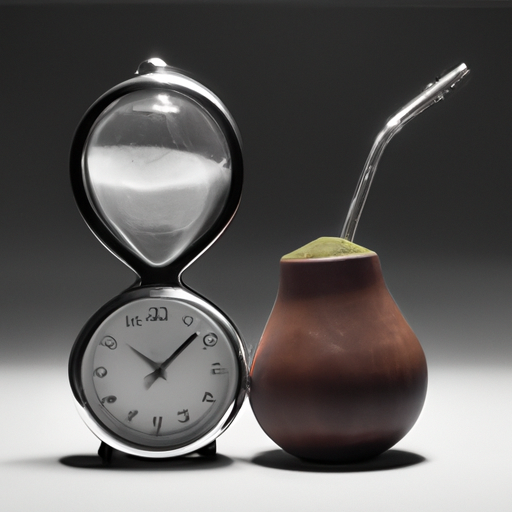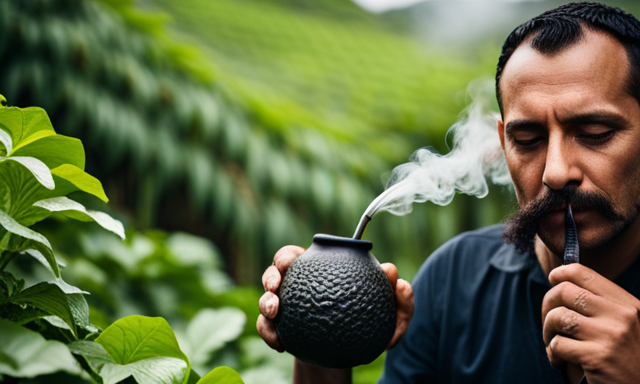Being an enthusiast of coffee, I consistently relish the morning jolt it provides. However, there are instances when coffee feels overly potent for my palate or leaves me feeling overly stimulated. It was during one of these times that I came across Yerba Mate Tea – a herbal brew that is caffeinated yet offers a gentle uplift without the adverse reactions commonly associated with coffee.
In this article, we will explore how much caffeine is in Yerba Mate Tea compared to other caffeinated beverages, as well as the benefits and risks associated with consuming it. Whether you’re looking for an alternative to your morning cup of joe or curious about trying something new, understanding the caffeine content and potential effects of Yerba Mate Tea can help you make an informed decision about incorporating it into your daily routine.
Key Takeaways
- Yerba mate tea contains 30-50 mg of caffeine per cup, providing a smooth energy boost.
- Excessive consumption of yerba mate tea can lead to negative side effects and may increase the risk of esophageal cancer.
- Recommended daily intake of yerba mate tea is 1-3 cups per day, and it should be consumed in moderation.
- Yerba mate tea should be avoided around meal times or when taking iron supplements, and should not be consumed before bedtime or on an empty stomach. Pregnant women should also limit their intake due to its caffeine content.
What is Yerba Mate Tea?
You’ve probably heard of green tea and black tea, but have you tried yerba mate tea? It’s a traditional South American drink that’s been consumed for centuries.
The beverage is made from the leaves of the yerba mate plant, which grows in the subtropical regions of Argentina, Brazil, and Paraguay. Yerba mate tea has a rich history and cultural significance in South America. The indigenous people of these regions have been drinking it for thousands of years, using it as a social drink during rituals and ceremonies.
As European explorers arrived in South America, they too became enamored with yerba mate tea’s unique flavor and energy-boosting properties. Today, yerba mate is an important part of the culture in many South American countries.
When it comes to caffeine content, yerba mate tea contains about 30-50 milligrams per cup. This may seem like a small amount compared to coffee or even regular black tea, but the effects are just as powerful. Yerba mate contains other stimulants such as theobromine and theophylline that work together to provide energy without causing jitters or anxiety.
Overall, yerba mate offers a smooth boost of energy that can help improve focus and productivity throughout the day. As you can see from its rich history and cultural significance as well as its moderate amount of caffeine content per cup compared to other popular beverages like coffee or black tea, yerba mate is an interesting option for those looking for an alternative source of natural energy without any unpleasant side effects.
Caffeine Content in Yerba Mate Tea
Wow, you’re in for a real jolt when you try yerba mate tea. This South American beverage is known for its energizing properties and is becoming increasingly popular among health enthusiasts. One of the most notable features of yerba mate tea is its caffeine content, which provides an excellent alternative to coffee.
Caffeine sources are plentiful in our daily lives, with coffee being one of the most common sources of this stimulant. However, did you know that yerba mate tea contains just as much caffeine as coffee? In fact, it has been found that a typical cup of yerba mate tea contains around 30-50mg of caffeine per 8oz serving compared to coffee’s 95mg per the same size serving. This makes it an excellent option for those who want to reduce their intake of coffee but still need a boost throughout the day.
The impact of brewing method on caffeine content cannot be ignored when discussing yerba mate tea. For instance, using hot water versus cold water can significantly affect the amount of caffeine present in your drink. Generally speaking, longer brew times and higher water temperatures will result in more caffeine being released from the leaves. So whether you prefer your yerba mate strong or weak will ultimately depend on your brewing method preference.
If you’re looking for a natural source of energy without relying on coffee or other caffeinated beverages, then yerba mate tea may be worth considering. With its comparable levels of caffeine to coffee and various brewing options available, this South American beverage offers an excellent alternative while still providing an energizing boost throughout the day. Stay tuned for my next section where we’ll compare yerba mate tea to other caffeinated beverages!
Comparison to Other Caffeinated Beverages
If you’re searching for alternative sources of energy, comparing yerba mate tea to other caffeinated beverages will help you make an informed decision. Yerba mate tea is known to contain caffeine that provides a boost in energy without the jitters or sudden crashes that coffee can cause.
On average, an 8-ounce cup of yerba mate tea contains about 30-50 mg of caffeine, which is less than half the amount found in a standard cup of coffee. While yerba mate tea has lower levels of caffeine compared to coffee, its effects are still noticeable and long-lasting.
Unlike espresso shots or energy drinks that provide an immediate burst of energy but quickly fade away, drinking yerba mate tea can provide sustained alertness for several hours. This makes it a great choice for people who need to stay focused and productive throughout the day without feeling overly wired or anxious.
If you’re looking for a healthier alternative to coffee or other caffeinated beverages, yerba mate tea is definitely worth considering. Its moderate caffeine content offers numerous benefits without causing any adverse side effects that are often associated with other stimulants. In the next section, we’ll explore some additional benefits of this amazing beverage and how it can improve your overall health and wellbeing.
Benefits of Yerba Mate Tea
When you sip on a steaming cup of this invigorating beverage, you’ll be pleased to know that yerba mate tea offers numerous health benefits that can help improve your overall wellbeing.
One of the most significant advantages is its antioxidant properties, which protect your body from harmful free radicals that cause cell damage and lead to chronic diseases such as cancer, diabetes, and heart disease.
Additionally, yerba mate tea contains several essential nutrients such as vitamins A, C, E, and B-complex vitamins. It also provides minerals like calcium, magnesium, potassium, and iron. These nutrients are vital for maintaining healthy bones and teeth, supporting muscle function, and nerve signaling in the body.
Moreover, drinking yerba mate tea has been linked to other health benefits like increased energy levels and mental clarity while reducing inflammation in the body. This natural stimulant can provide an energy boost without the crash often associated with coffee or energy drinks. However, it’s crucial to note that moderation is key when consuming any caffeinated beverage.
Drinking yerba mate tea provides many health benefits due to its antioxidant properties and nutrient content. However, it’s essential to recognize that there are potential risks and side effects associated with excessive consumption of caffeine-containing beverages. Let’s take a closer look at these concerns in the next section.
Risks and Side Effects
As I continue to explore the benefits of Yerba Mate Tea, it’s important to also consider the potential risks and side effects associated with its consumption.
Allergic reactions are a possibility, especially for those who have a sensitivity to caffeine or other related compounds.
Additionally, Yerba Mate Tea may interact with certain medications, so it’s important to consult with a healthcare provider before adding it to your routine.
Finally, overconsumption can lead to negative side effects such as anxiety and insomnia.
Allergic Reactions
Beware of potential allergic reactions to yerba mate tea, as they can cause discomfort and even be life-threatening. Allergic reactions are unpredictable and can occur when the immune system overreacts to a foreign substance in the body.
Symptoms of an allergic reaction to yerba mate tea may include itching, hives, swelling of the lips or tongue, difficulty breathing, and anaphylaxis. If you experience symptoms of an allergic reaction after consuming yerba mate tea, seek immediate medical attention.
The first step in managing allergies is to avoid the allergen altogether. If you’ve been diagnosed with a severe allergy, carry epinephrine injectors with you at all times. It’s essential to read product labels carefully and ask questions about ingredients if you’re unsure about what’s in a product before consuming it.
In the next section, we’ll discuss how yerba mate tea interacts with certain medications.
Interaction with Medications
Interacting with certain medications, yerba mate tea can potentially cause adverse effects. It’s important to be aware of possible risks when consuming this tea alongside medication. Here are three things to keep in mind:
-
Yerba mate contains caffeine and other stimulants that may interact with some medications, such as those used for anxiety or depression. This could lead to increased side effects such as nervousness, jitters, or insomnia.
-
Yerba mate has been found to decrease the absorption of iron from food and supplements, so it’s important to avoid drinking it around meal times or taking iron supplements at least 2 hours before or after consuming yerba mate.
-
Certain medications such as antibiotics, blood thinners, and drugs metabolized by the liver may interact with yerba mate and alter their effectiveness or toxicity levels.
It’s always important to speak with a healthcare professional before consuming any new herb or supplement while on medication. With this knowledge in mind, let’s move onto the next section about overconsumption of yerba mate tea.
Overconsumption
Drinking too much of this beloved herbal beverage can lead to negative effects on your health. While yerba mate tea is known for its numerous health benefits, overconsumption can put you at risk for certain health issues.
The risks of overconsumption include digestive problems such as nausea and vomiting, nervousness, insomnia, and increased heart rate. In particular, excessive caffeine intake from yerba mate tea may have a negative impact on heart health. Caffeine is a stimulant that affects the central nervous system and can increase blood pressure and heart rate.
This can be especially dangerous for individuals with underlying heart conditions or high blood pressure. Therefore, it’s important to consume yerba mate tea in moderation to avoid these potential adverse effects.
Now let’s move onto the next section where we’ll discuss how to prepare and serve yerba mate tea properly.
Preparation and Serving
To get the most out of your yerba mate tea, it’s important to know how to properly prepare and serve it. Yerba mate tea preparation involves using hot water that isn’t boiling, as boiling water can make the taste bitter. The ideal temperature for brewing yerba mate tea is around 160-180 degrees Fahrenheit. Steeping time should be kept between 3-5 minutes, as over-steeping may result in a bitter taste.
Serving techniques can vary depending on personal preferences and cultural traditions. Some people prefer to drink yerba mate tea from a traditional gourd with a metal straw called ‘bombilla,’ while others use regular cups or mugs.
It’s important to note that when sharing yerba mate tea with others, it’s customary to serve the first cup to the person who prepared it as a sign of respect.
Yerba Mate Tea preparation and serving size also play an essential role in determining caffeine intake. A standard serving size for yerba mate tea is about 8 ounces or one cup. However, some brands offer ready-to-drink bottles or cans containing more than one serving size per container. It’s recommended to read labels carefully and pay attention to caffeine content per serving before consuming them regularly.
Now let’s dive into different brands and varieties of yerba mate teas available in the market today!
Brands and Varieties
Now that we know how to prepare and serve yerba mate tea, let’s dive into the world of brands and varieties. There are so many options out there, it can be overwhelming! However, I’ve done some research and narrowed down a few popular brands for you to compare.
- Guayaki: A well-known and widely available brand with a variety of flavors including traditional, peppermint, lemon, and chai.
- EcoTeas: This brand offers organic and fair trade options in traditional flavor as well as unique blends such as Tulsi Ginger Mate.
- Cruz de Malta: An Argentinean brand known for their bold flavor profile and high caffeine content.
- Rosamonte: Another Argentinean brand with a strong taste but smoother finish than Cruz de Malta.
In terms of flavor varieties, most yerba mate teas have a similar earthy taste. However, some brands offer flavored options like those mentioned above. It’s worth trying different brands to see which one suits your palate best.
Now that we’ve covered the different brands and varieties available, let’s move on to where you can buy yerba mate tea.
Where to Buy Yerba Mate Tea
I’ve been a fan of yerba mate tea for years, and I know that finding a reliable source can be challenging. Luckily, there are plenty of options to choose from when it comes to purchasing yerba mate tea.
Online retailers like Amazon and specialty stores like Teavana offer a variety of brands and flavors, while health food stores often carry organic and fair trade options. However, before making a purchase, it’s important to consider whether or not yerba mate tea is safe for everyone – including pregnant women.
Online Retailers
Looking for a quick caffeine boost? Check out online retailers for yerba mate tea options.
There are plenty of benefits to shopping for yerba mate tea online, including easy access to a wide variety of brands and flavors. Plus, many online retailers offer competitive pricing and the convenience of home delivery.
However, there are also some potential drawbacks to buying yerba mate tea online. One downside is that you may not be able to see or smell the product before purchasing it, which could lead to disappointment if the quality isn’t up to par. Additionally, market trends show that some consumers prefer shopping in person at specialty stores where they can interact with knowledgeable staff and sample products before making a purchase.
Nonetheless, if you’re looking for convenience and selection when it comes to buying yerba mate tea, checking out online retailers is definitely worth considering.
Specialty Stores
If you’re searching for a unique and personalized shopping experience, specialty stores offer a wide array of options for you to explore and discover. When it comes to yerba mate tea, specialty stores can be a great resource for finding locally sourced and high-quality blends. These stores typically have a dedicated section or area devoted to teas, where you can find various brands and blends of yerba mate.
Local availability is one of the biggest advantages that specialty stores offer when it comes to yerba mate tea. You can often find blends from small local producers that aren’t available online or in larger chain stores. Additionally, these stores may carry hard-to-find varieties or limited edition blends that are popular among avid yerba mate drinkers. As popularity trends continue to rise for this traditional South American beverage, specialty stores remain a go-to destination for those looking for unique and authentic options.
Moving on to health food stores, it’s worth noting that these retailers also play an important role in the yerba mate market.
Health Food Stores
Health food stores offer a range of natural and organic products, including yerba mate blends that cater to health-conscious consumers. Yerba mate tea is a popular herbal beverage that originates from South America, and it has been consumed for centuries due to its numerous health benefits.
Some of the benefits associated with yerba mate tea include reducing fatigue, improving mental clarity, and enhancing physical performance. Different types of yerba mate tea are available in health food stores, such as roasted or unroasted yerba mate leaves, flavored or blended versions, and even caffeine-free options for those who are sensitive to this stimulant.
It’s important to note that while yerba mate tea contains less caffeine than coffee or black tea, it still has enough caffeine to provide an energy boost. Therefore, it’s recommended to consume in moderation and avoid drinking it before bedtime or on an empty stomach.
Is yerba mate tea safe for everyone? Let’s find out in the next section about potential side effects and precautions when consuming this herbal drink.
Is Yerba Mate Tea Safe for Everyone?
It’s important to consider potential risks before indulging in yerba mate tea, as it can have some adverse effects on certain individuals. While the tea is generally considered safe for most people, those with caffeine sensitivity or high blood pressure should be cautious when consuming it.
Additionally, there are concerns that excessive consumption of yerba mate tea may increase the risk of esophageal cancer. However, it’s not all negative news when it comes to yerba mate tea. In fact, there are many health benefits associated with this herbal beverage.
Yerba mate contains antioxidants and nutrients that may help improve digestion, boost metabolism, and enhance mental focus. Furthermore, studies have shown that moderate consumption of yerba mate tea may even protect against cardiovascular disease and diabetes. With these potential benefits in mind, it’s worth considering incorporating yerba mate into your diet – as long as you do so responsibly.
Can’t find the answer you’re looking for? It’s always best to consult with a healthcare professional before making any significant changes to your diet. While yerba mate tea is generally safe, it’s always better to err on the side of caution.
Can I Drink Yerba Mate Tea While Pregnant?
You may be wondering if it’s safe to drink yerba mate tea during pregnancy. As a pregnant woman myself, I did some research and found that yerba mate should be consumed in moderation. This is because it contains caffeine, which can cross the placenta and affect the baby’s heart rate and growth.
The American Pregnancy Association recommends limiting caffeine intake to 200 milligrams per day. A typical cup of yerba mate tea has about 30-50 milligrams of caffeine, so it’s safe to have one or two cups per day. However, it’s important to note that not all brands have the same caffeine content, so check the label before consuming.
How Many Cups of Yerba Mate Tea Can I Drink Per Day?
While it’s important to know if you can drink yerba mate tea while pregnant, it’s also important to consider how much of it you can consume in a day. As someone who enjoys yerba mate tea regularly, I wanted to learn more about the recommended daily intake and the potential benefits and drawbacks associated with drinking too much.
According to studies, consuming moderate amounts of yerba mate tea is generally safe for most people. The recommended daily intake ranges from 1-3 cups per day, which provides approximately 30-100 mg of caffeine per cup. However, exceeding this amount may lead to negative effects such as insomnia, anxiety, and increased heart rate. It’s also worth noting that some brands may have higher caffeine levels than others. To help visualize this information better, here’s a table summarizing the recommended daily intake and average caffeine content per cup:
| Daily Intake | Caffeine Content (mg) |
|---|---|
| 1 cup | 30-50 |
| 2 cups | 60-100 |
| 3 cups | 90-150 |
While yerba mate tea offers various health benefits such as antioxidant properties and improved digestion, it’s essential to be mindful of how much you consume in a day. Drinking within the recommended range is generally considered safe but exceeding it can lead to adverse effects. So if you’re a fan of this South American beverage like me, make sure to enjoy it in moderation!
Frequently Asked Questions
How does the caffeine in Yerba Mate Tea affect the body differently than caffeine in coffee or other caffeinated beverages?
I know some people might think that caffeine is just caffeine, regardless of where it comes from. But actually, the effects of caffeine can vary depending on the source.
For example, research suggests that the caffeine in yerba mate tea may affect the body differently than the caffeine in coffee or other caffeinated beverages. This is because yerba mate contains other compounds besides caffeine that can impact metabolism and other physiological processes.
When we consume caffeine, it increases our heart rate and blood pressure, and can also improve alertness and cognitive performance. However, studies have shown that yerba mate may have additional benefits such as improved digestion and reduced inflammation.
Additionally, some research has suggested that consuming yerba mate may not lead to the same crash or jitters as drinking coffee due to its unique combination of compounds.
Overall, while both coffee and yerba mate contain caffeine, there are differences in how they affect our bodies due to variations in their chemical composition.
Can Yerba Mate Tea be used as a weight loss aid?
I’ve been exploring the potential benefits of yerba mate tea as a weight loss aid. From my research, it seems that yerba mate may be able to boost metabolism and suppress appetite, making it a useful tool for those looking to shed some pounds.
Yerba mate contains compounds like caffeine and theobromine that can increase energy expenditure and fat oxidation, leading to greater calorie burn. Additionally, studies have shown that consuming yerba mate before meals can help reduce hunger levels, resulting in decreased food intake overall.
While more research is needed to fully understand the effects of yerba mate on weight loss, these initial findings are promising.
Does Yerba Mate Tea have any antioxidants or other health benefits besides caffeine?
When it comes to yerba mate tea, there’s more to it than just caffeine. This tea has been consumed for centuries and is known for its nutritional content, making it a symbol of South American culture.
Yerba mate contains numerous antioxidants that can help protect the body against harmful free radicals. These antioxidants have been shown to reduce inflammation, improve cardiovascular health, and even have anti-cancer properties.
Additionally, yerba mate is rich in vitamins and minerals such as vitamin C, B vitamins, potassium, and magnesium. So while caffeine may be one of the most well-known components of yerba mate tea, it’s important not to overlook the other potential health benefits this drink has to offer.
Is it safe to consume Yerba Mate Tea while pregnant or breastfeeding?
As a medical professional, I advise against consuming yerba mate tea while pregnant or breastfeeding. This is because the caffeine content in yerba mate tea can negatively affect fertility and lactation.
The effects of caffeine on fertility are still being studied, but it is known that high levels of caffeine intake can decrease the chances of conception and increase the risk of miscarriage.
Similarly, excessive caffeine consumption during lactation may cause irritability, insomnia, and decreased milk production in nursing mothers. Therefore, to ensure the safety and well-being of both mother and baby, it’s best to avoid yerba mate tea during pregnancy and breastfeeding.
Are there any cultural or traditional uses of Yerba Mate Tea in South America or other regions where it is commonly consumed?
Yerba mate tea is a staple in South American culture, where it’s commonly consumed as a social beverage. In fact, it’s estimated that over 90% of Argentinians drink yerba mate regularly.
The cultural significance of yerba mate extends beyond just a simple beverage – it’s often used to bring people together and build relationships. Traditional preparation involves steeping the dried leaves in hot water and drinking from a shared gourd using a metal straw called a bombilla. This method encourages communal drinking and fosters a sense of community.
However, it’s important to note that there are variations in preparation methods depending on the region or country where yerba mate is consumed. Overall, yerba mate tea plays an integral role in South American culture and traditions, serving both as a social lubricant and symbol of community.
Conclusion
So, there you have it – yerba mate tea is a fantastic alternative for those who love the taste of coffee but want to avoid its high caffeine content. It’s packed with antioxidants, vitamins, and minerals that help improve your overall health and well-being.
Plus, it has a unique flavor profile that will leave you wanting more. Next time you’re in need of an energy boost or just want to try something new, consider reaching for a cup of yerba mate tea.
The process of preparing it can be meditative in itself – from heating the water to steeping the leaves and pouring it into your favorite mug. Sipping on this delicious beverage while taking in the aroma and warmth is sure to transport you to a state of relaxation and tranquility.
Give it a try today!


